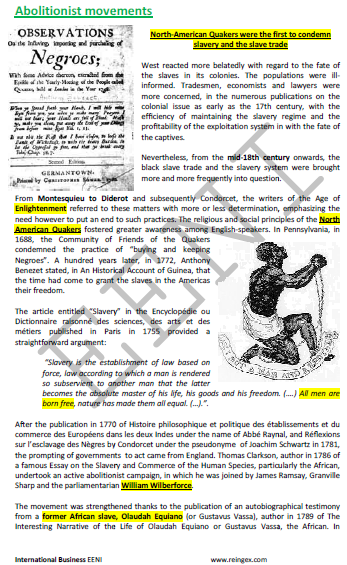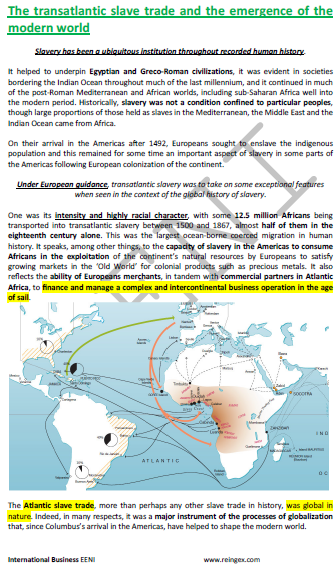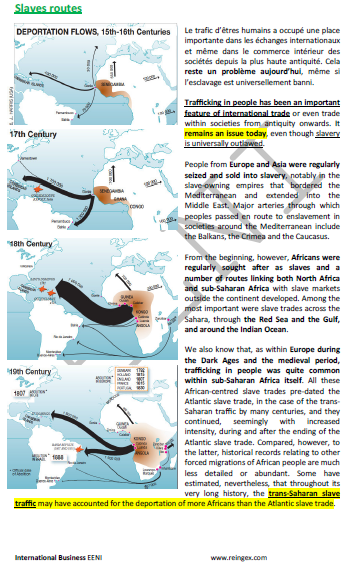African Slave Trade

Transatlantic African Slave Trade and Slavery
The Transatlantic African Slave Trade (men, women, and children): a crime against humanity.
1- Introduction to the African Slave Trade.
- Role of the UNESCO. Project: Slave Route
- Introduction to the African Slave Trade in the Arab-Muslim World
- Indian Ocean Trade
- Slavery as “institution”
2- Transatlantic African Slave Trade and Slavery.
- Slave Routes
- Why the African slaves?
- The Transatlantic African Slave Trade and its impact on the African, European, and American socio-economic development
3- Similarities and Differences between the African Slave Trade.
- History of Slavery in Africa
- Moral dimensions of the African Slave Trade
- Transatlantic African Slave Trade
- The African Slave Trade from 16th to 18th centuries (General History of Africa - UNESCO)
4- Slave Uprisings
- Role of the Quakers, William Wilberforce
- The case of the abolition in Santo Domingo
- Haitian Revolution
- Prohibitions of the slave trade
- Abolitionists decrees
- End of Slavery
- From the abolition of Slavery to Colonization
- Abolition by countries
- Abolition of slave trade (UNESCO)
- Diaspora Division of the African Union
- Working Group of Experts on People of African Descent (United Nations)
6- Post-slavery societies in America (the African Diaspora).
- African Diaspora in America
- Creation of their identity. Marcus Garvey. Aimé Césaire
- Contributions to society: music (jazz), language, sciences, and religion
- Racist theories
- Socio-psychological consequences
7. Slavery in a globalized World
- Conventions prohibiting the Slavery
- Supplementary Convention on Abolition of Slavery
- Slavery today
- New forms of slavery
8- Some personages and institutions related abolitionism
- Quakers
- Henry David Thoreau
- William Wilberforce
- Toussaint Louverture
- Harriet Tubman
- Frederick Douglass
- Victor Schoelcher

The Subject “African Slave Trade and the Slavery” belongs to the following Online Programs taught by EENI Global Business School:
Doctorate in African Business, Ethics, Religion & Business.
Languages:  or
or  Traite Negriere
Traite Negriere  Tráfico negreiro
Tráfico negreiro  Trata de Negros.
Trata de Negros.

Transatlantic African Slave Trade
Between 1500 and 1900:
- Near four million of African slaves were transported to the Indian Ocean Islands plantations
- Near eight millions were exported to the Mediterranean countries
Figures (UNESCO) on the number of deportees (VIII - XIX century): 24 million Africans.
- Estimation of the African population (half of the nineteenth century): 100 million Africans
- What the African population might have been (half of the nineteenth century): 200 million Africans
African Slave Trade:
- African Historical Trafficking: (estimation tens of million Africans)
- Muslim Trade (7th - 20th centuries, 8 - 12 million Africans):
- Tran-Saharan Trade: Destination to the Maghreb, Egypt, and the Mediterranean region (eight million)
- Oriental Trade: Destination
- Arabian Peninsula
- Indian Ocean Islands (four million)
- Transatlantic African Slave Trade:
- organized by the Europeans: Spain - Castile (the founders), the UK, France, Portugal, the Netherlands, and Denmark. The U.S. and Brazil
- Centuries: 16th - 19th (400 years)
- Destination: throughout the Americas and the Caribbean
- 12 million Africans
Africans descendants of the Diaspora have largely contributed to the European, American, and the Asian development.
Sample - African Slave Trade and Slavery

More information (UNESCO):
Sample:

(c) EENI Global Business School (1995-2024)
We do not use cookies
Top of this page



